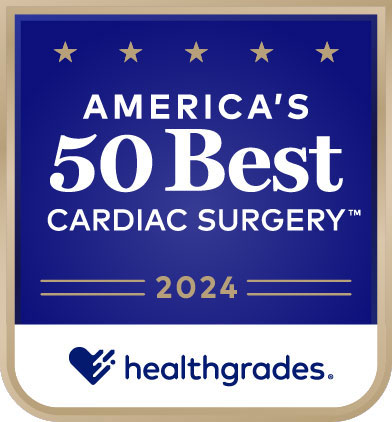Heart surgery excellence on the Seacoast
At the Heart & Vascular Institute at Portsmouth Regional Hospital, we're known for our advanced heart surgery experience. We're the only cardiac surgery program on the Seacoast — other area hospitals refer their patients to our heart surgeons.
You can count on leading-edge care from our highly skilled heart surgery team:
- Our heart surgeons have performed thousands of heart procedures.
- We specialize in minimally invasive heart procedures, which offer less pain and scarring, a shorter hospital stay, and a faster recovery.
- Our high-tech hybrid operating suite allows us to perform minimally invasive and open surgeries seamlessly.
- You receive care from highly skilled surgeons who use the latest surgical advancements, including minimally invasive approaches for valve replacement and coronary artery bypass surgery.
- We make sure you have all the information you and your family need to make informed choices about your care. You have the power to decide what's best for you.
Minimally invasive heart procedures
Whenever possible, our heart surgeons use minimally invasive approaches to help reduce your hospital stay and help you feel better faster. These procedures are performed through small incisions, usually less than two inches, using tiny instruments and advanced imaging equipment. The approach is less invasive than traditional open-heart surgery. We offer the same leading-edge approaches of large medical providers right here in your community — with a personal touch from a team you can trust.
Coronary artery bypass graft (CABG)
This less invasive alternative to an open-heart CABG — also called beating heart surgery — allows surgeons to reroute blood around a blocked or damaged heart artery without stopping your heart and using a heart-lung machine. We use smaller incisions and perform this surgery while your heart is still beating. That means there's less risk during surgery and you recover more quickly.
Heart valve procedures
Our team of heart surgeons, interventional cardiologists and cardiovascular imaging specialists offer minimally invasive approaches to treat heart valve problems, such as valve regurgitation (valves don't close properly) or valve stenosis (narrowed valves that don't open entirely).
Balloon valvoplasty
Surgeons make a small incision in your upper thigh and thread a catheter (thin, flexible tube) with a deflated balloon into a vein and guide it to the narrowed heart valve. We inflate the balloon, widening the valve and restoring blood flow.
Mitral valve repair or replacement
This surgery treats mitral valve prolapse (valve flaps bulge backward), regurgitation or stenosis. Surgeons make a small incision on your side to access the mitral valve and treat your condition, rather than making a large incision on your chest and cutting through your breastbone. This minimally invasive approach offers less pain and a quicker recovery.
Transcatheter aortic valve replacement (TAVR)
We use this procedure for people with aortic valve stenosis who can't have open-heart surgery without a significant health risk. Surgeons insert a catheter into a small incision in your upper thigh or chest and position it near the valve. We pass a replacement valve (made of cow or pig tissue) through the catheter and place the new valve over the damaged aortic valve.
Advanced heart surgery
Our heart surgeons have the expertise to perform even the most complex heart surgeries. We often care for people who have advanced heart disease and other health conditions and require a high level of care. Our experts provide trusted care and personalized treatment to offer you the best possible results.
We provide open-heart procedures such as:
- Arrhythmia surgery (maze procedure) - Surgeons create a series of controlled scar lines within the heart's atria, redirecting the electrical impulses and restoring normal rhythm in atrial fibrillation (a very fast heartbeat).
- Repair and replacement of heart valves - Including treatment to correct previous valve procedures
- Septal myectomy - Surgery to treat hypertrophic cardiomyopathy (a thickened heart muscle) that removes thickened heart tissue
- Thoracic aortic aneurysm repair - Surgery that repairs a weak spot or bulge, called an aneurysm, in the thoracic aorta, which supplies blood to your heart.
- Atrial fibrillation implant device - A specialized procedure is a minimally invasive approach to reducing the risk of stroke in individuals with atrial fibrillation (AFib) by implanting a small device in the left atrial appendage to prevent blood clots from forming and potentially causing a stroke.
- Extracorporeal membrane oxygenation (ECMO) - is a life-saving medical technique providing temporary support for patients with severe respiratory or cardiac failure. It involves using a machine that pumps and oxygenates blood outside the body, allowing the heart and lungs to rest and heal while maintaining oxygenation and circulation.
State-of-the-art cardiac surgery recovery unit
Our cardiac surgical stepdown unit is specifically for people recovering from open-heart surgery and other complex heart procedures. We use the latest equipment to keep a close eye on you, offering you and your family peace of mind knowing you're in expert hands.
Our heart surgeons, cardiologists, cardiac nurses and rehabilitation specialists work together to give you complete care and personal attention. We make your health, safety and comfort our priorities.
How healthy is your heart? Take our quiz

In 2023, Luci Garnder underwent TAVR -- transcatheter aortic valve replacement at Portsmouth Regional Hospital. She could not be happier with the outcome, and called the whole experience "perfect."
Complete care for vascular conditions
Our skilled vascular specialists treat a full spectrum of conditions affecting your arteries and veins. We use sophisticated imaging tests to find blood vessel problems and the latest minimally invasive approaches to treat them.
We specialize in endovascular procedures — approaches allowing us to access your arteries and veins through a small puncture. Using catheters (thin, flexible tubes) and imaging equipment, we can see inside your blood vessels and treat vascular conditions throughout your body. These incision-free procedures offer less pain, a shorter hospital stay and a quicker recovery. When a less-invasive treatment isn't right for you, our vascular surgeons have the expertise to perform even the most complex vascular surgeries.
At our Heart & Vascular Institute, we give you individual attention and a personalized treatment plan to ensure you get the best possible results. We make sure you understand your condition and treatment options so you can make informed choices about your care.
Vascular conditions we treat
We provide treatment for all types of blood vessel conditions, including:
- Aneurysm (weakened areas of blood vessel walls), including abdominal aortic aneurysms
- Blood clot, also called a thrombus
- Carotid artery disease (buildup of fatty deposits, called plaque, in blood vessels in your neck that supply blood to your brain)
- Critical limb ischemia (severe blockage of blood flow to one or both arms or legs)
- Peripheral artery disease (buildup of plaque in the blood vessels of your arms and legs)
- Varicose veins (large, raised, twisted blood vessels that mostly occur in the legs)
- Vascular malformations (abnormally developed blood vessels)
Leading-edge vascular procedures expertise
When you need a vascular procedure, you can be confident you're in highly capable hands. Our surgeons are known for their advanced expertise and skill. You can get the same advanced procedures you'd expect at a large medical facility right here, close to home — no travel necessary.
Angiography
We use this advanced X-ray imaging test to examine your blood vessels and look for narrowing or blockages. We place a small catheter inside a blood vessel and inject a dye to show the vessel more clearly. Your doctor numbs the area where they insert the catheter to keep you comfortable during the procedure. Vascular surgeons also use angiography to guide catheters and stents during minimally invasive treatments.
Abdominal aortic aneurysm repair
This procedure repairs a weak spot in the lower abdominal section of the aorta, a major heart artery. Vascular surgeons place a stent graft (mesh tube) inside your artery to hold it open and prevent it from bursting. Our surgeons use an endovascular approach with a catheter to repair the artery whenever possible.
Endarterectomy
When a plaque buildup inside an artery reduces or stops blood flow, vascular surgeons use an endarterectomy to remove the buildup and restore blood flow. Often, we use this procedure to restore blood flow in your carotid arteries, which supply blood to your brain, and lower your risk of a cerebrovascular accident (stroke). To access the carotid artery and restore blood flow, your surgeon makes a small incision on the side of your neck.
Transcarotid artery revascularization (TCAR)
We use minimally invasive TCAR to treat carotid artery blockages or blood flow problems and help prevent a stroke. Surgeons make a small incision above your collarbone and place a catheter inside the blocked artery. During the procedure, the catheter is connected to a machine that temporarily diverts blood flow away from your brain, filters the blood and returns the blood through a second tube in your thigh. This rerouting ensures a blood clot or piece of plaque doesn't travel to your brain during the procedure, causing a stroke.
Varicose vein treatment
We offer laser vein treatment, such as radiofrequency ablation, a minimally invasive approach that sends a high-intensity light that produces heat and is delivered through a catheter to the affected vein, causing it to close and fade over time. Our vascular surgeons make a small puncture near the varicose vein and use a laser to heat the vein. This closes off the vein and prevents blood from flowing through it. You receive a local anesthetic, so there's no pain during the procedure. There's only minor discomfort afterward, and recovery is quick. There's minimal or no scarring with this treatment.
Vascular bypass surgery
Surgeons can restore blood flow in a blocked artery by taking a vein from another area of your body — called a graft — and using it to reroute blood around the blockage. We attach the graft above and below the artery blockage, allowing blood to bypass the blockage.


